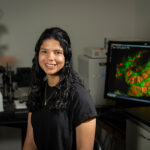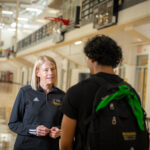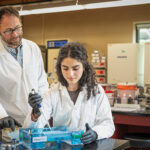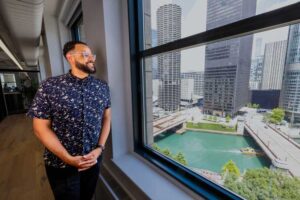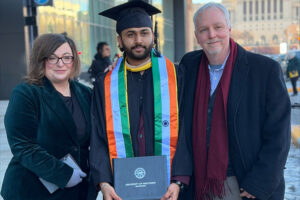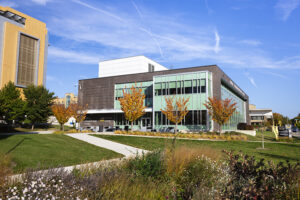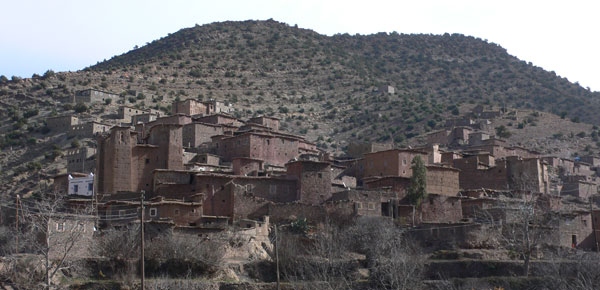
The University of Wisconsin-Milwaukee’s Zilber School of Public Health and the Middle Eastern Studies program in the College of Letters & Science are collaborating on a summer program in Morocco for graduate and undergraduate students.
The six-credit program in Global Health, the first of its kind at UWM, will focus on maternal and infant health in Morocco while giving students an in-depth exposure to Arabic language and Moroccan history and culture. Global Health is an emerging interdisciplinary field at UWM, and this is the first international offering for the Zilber School of Public Health.
Ellen Amster, assistant professor of Middle East history who spent 15 years working in Morocco, and Karla Bartholomew, assistant professor of public health policy, are co-leaders.
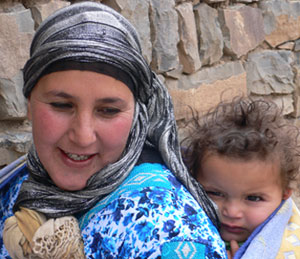
Morocco offers students the opportunity to study a developing country and experience both modern cities and remote rural regions, says Amster. The students will spend three weeks in the cities of Rabat, Fez and Marrakesh, and one week in the remote rural villages of Zawiya Ahansal in the High Atlas Mountains. The students will live with local families, experiencing regional foods and learning about both Berber and Arab culture.
In Rabat, students will learn Moroccan colloquial Arabic, study the impact of rapid urbanization in a developing country and consider social factors that impact maternal and infant health such as poverty, urbanization, law and gender. In the mountainous rural area, students will have fieldwork experiences exploring community health needs, development programs, traditional healing practices and environmental issues.
Working within an Islamic framework
“Morocco is an Islamic country in both religion and culture,” says Amster, which means that public health organizations and nongovernmental organizations (NGOs) must provide services within that cultural and religious framework.
For example, because the Moroccan legal system interprets sex outside of marriage as adultery, unwed mothers are criminalized and stigmatized, which often leads to child abandonment. Students will meet with Aicha Ech-Channa, who won the 2009 Opus prize for her NGO Solidarité Feminine (Women’s Solidarity), which provides unwed mothers with job training, housing stipends, child care and medical support to allow them to keep and support their babies.
Health organizations in Morocco have learned to work within this religious framework, says Bartholomew. While Islamic authorities condemn homosexuality and drug use, the NGO Association de Lutte Contre le Sida (Association Fighting Against AIDS) has recruited imams to act as peer AIDS educators. “Imams in Morocco support AIDS education under the philosophy of minimizing harm and damage, which is an Islamic concept,” says Amster.
Modern housing to rural health
Students will see modern housing solutions built to replace shantytowns in the colonial (1912-1956) and postcolonial industrial city of Casablanca, and experience medieval Islamic architecture in the ninth-century city of Fez. In addition to research and fieldwork, students will meet with women’s rights groups, feminist lawyers, the National Institute of Hygiene (the Moroccan equivalent of the CDC) and American programs for women and children from the Peace Corps and USAID.

Morocco is currently experiencing an influx of illegal immigrants from sub-Saharan Africa, which exacerbates underlying public health issues such as tuberculosis, HIV/AIDS and maternal-infant health, according to Bartholomew. The Moroccan state is struggling to meet the health needs of these immigrants, and already provides healthcare to illegal, HIV-infected immigrants.
In rural areas, a minority, mostly Berber population has less access to state services and basic needs like food, clean water, adequate shelter, education and healthcare services. The students will spend time assessing community health needs and learning about community solutions and rural health by working with a local association that coordinates with national and international groups.
Co-leaders bring a wealth of experience
Both Amster and Bartholomew bring extensive experience to the summer program. Amster spent several years in Morocco for fieldwork, Arabic study and medical research. Her interest in medical issues grew out of her work as a simultaneous Arabic-English-French translator for ORBIS, which led an eye surgery mission to Morocco in 1999. Her forthcoming book, “Medicine and the Saints: Science, Islam, and the Colonial Encounter in Morocco” (University of Texas Press, 2013), is a history of medicine in Morocco.
Bartholomew, who specializes in infant and maternal health, has worked in community health programs in locations ranging from rural areas in the United States, including remote bush Alaska, to Central and South America. She trained and worked as a physician assistant, and earned her master of public health in internal health, a law degree with a specialization in health law, a master of public health in international law and a doctorate in policy development and program evaluation in health policy.
At this point, 13 students have been accepted into the summer program from a variety of areas, including Public Health, Religious Studies, Global Studies, Anthropology, Women’s Studies, Arabic, Nursing and other areas.
Amster and Bartholomew made a site visit to Morocco in January with funding from a U.S. Department of Education grant (UISFL) awarded to UWM for 2009-12. That grant also provides $8,000 in support for running the program in the summer of 2012. They’re looking forward to introducing students to Morocco and hoping to build relationships that will lead to ongoing collaborations and future field placements for students.
“We are delighted to offer this summer experience as part of our commitment to global health and improving health outcomes for women here at home and around the world,” says Magda Peck, dean of the School of Public Health. The Morocco summer program can serve as a template for both the School of Public Health and UWM for creating relevant global health experiences grounded in cultural immersion and current events, she adds.
“The Arab Spring is motivated by the failures of the welfare state in the Islamic world,” says Amster. “It’s a good time to think about health and healthcare in a place like Morocco.”
